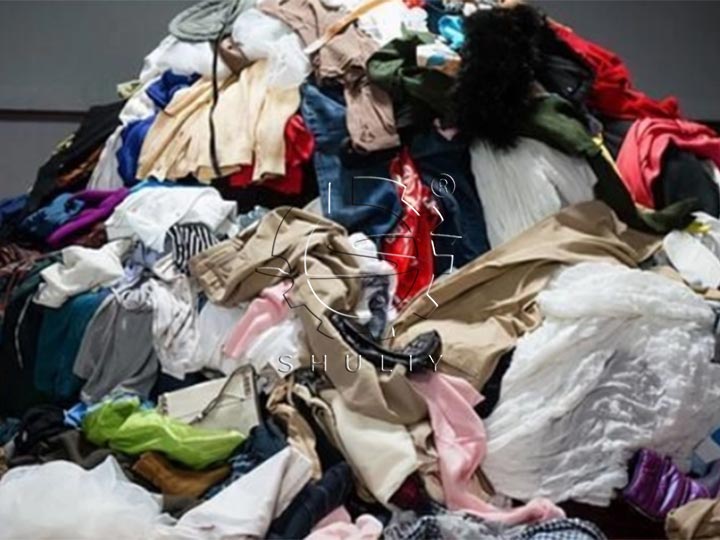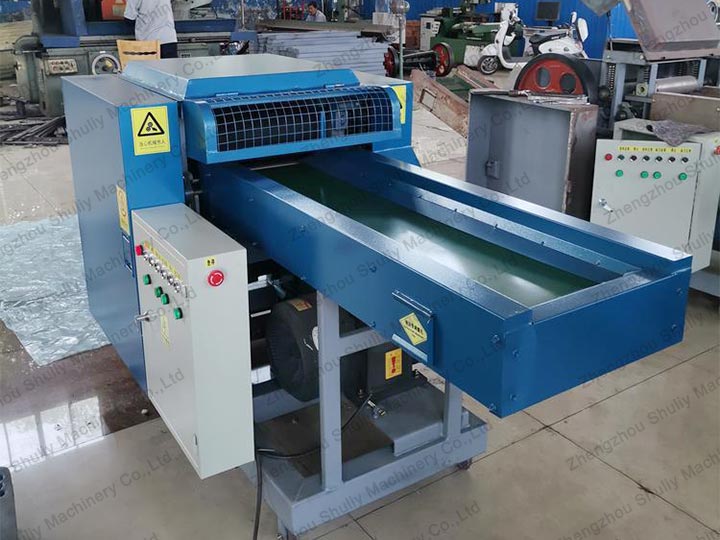천 재활용은 자원을 절약하고 환경을 보호하는 데 매우 중요합니다. 천 걸레는 재활용 및 재사용하여 많은 유용한 제품을 생산할 수 있습니다. 우리는 직물 재활용 장비를 사용하여 직물을 중앙 집중화한 다음 이를 다른 제품으로 처리할 수 있습니다. 그렇다면 천 재활용의 구체적인 용도는 무엇입니까?

천 재활용을 위한 천 걸레의 분류
면직물
면직물은 모든 종류의 면직물을 총칭하는 용어입니다. 주로 패션, 캐주얼 의류, 속옷, 셔츠 제작에 사용됩니다. 면직물의 장점은 보온성이 좋고 부드러우며 피부에 밀착되고 흡습성, 통기성이 매우 좋다는 점입니다. 단점은 수축과 주름이 생기기 쉽고, 착용 시 자주 다림질을 해야 한다는 점입니다.
화학섬유
화학 섬유는 고분자 화합물로 만들어진 섬유로 만들어진 직물입니다. 일반적으로 화학섬유는 인공섬유와 합성섬유 두 가지로 분류된다. 그들의 일반적인 장점은 밝은 색상, 부드러운 질감, 부드럽고 편안한 것입니다. 화학섬유의 단점은 내마모성, 내열성, 흡습성, 통기성이 좋지 않다는 점이다.
화학섬유는 열에 노출되면 쉽게 변형되고 정전기가 발생하기 쉽습니다. 화학섬유는 개발 초기 단계에서 세 가지 주요 이점을 가지고 있습니다. 첫째, 내구성이 있습니다. 둘째, 관리가 용이하고 주름방지, 다림질이 되지 않는 특성을 가지고 있습니다. 셋째, 산업화, 대량생산이 가능하다.
명주
실크는 실크를 원료로 짠 다양한 실크 직물의 총칭입니다. 종류도 많고 성격도 다양해요. 실크는 모든 종류의 의류, 특히 여성 의류를 만드는 데 사용될 수 있습니다. 장점은 가볍고 얇으며 핏이 좋고 부드러우며 매끄러우며 통기성이 좋고 컬러풀하며 윤기가 나고 착용감이 편안합니다. 하지만 이런 종류의 직물의 단점은 주름이 생기기 쉽고 강도가 충분하지 않으며 빨리 퇴색된다는 것입니다.
리넨
린넨은 대마, 아마, 모시, 황마, 사이잘삼, 아바카 등 다양한 대마 식물 섬유로 만든 천의 일종입니다. 리넨은 일반적으로 캐주얼 의류와 작업복 제작에 사용됩니다. 현재는 일반 여름옷을 만드는 데에도 사용됩니다. 린넨의 장점은 매우 높은 강도, 흡습성, 열전도성, 통기성입니다. 단점은 착용감이 별로 좋지 않고, 외관이 거칠고 뻣뻣하다는 점입니다.

천리사이클 사용
고물 옷 재활용은 “재활용 옷”으로도 재활용될 수 있는데, 이는 섬유 절단기를 사용하여 자투리 및 폐기물을 찢어진 섬유로 분쇄하는 것입니다. 그런 다음 식물 섬유 바인더와 다양한 화합제를 첨가하고 눌러서 형성합니다.
이 재활용 복합섬유는 다시 옷을 만드는데 사용될 수 있다. 가난한 것들은 캔버스, 걸레 천 등으로 사용할 수 있으며 청소 후 인형 옷과 같은 천과 관련된 DIY 재료를 만드는 데 사용할 수 있습니다.
스크랩 천은 장식 재료에 일반적으로 사용되는 재료입니다. 화학 섬유 카펫, 부직포 벽지, 린넨 천, 나일론 천, 컬러 테이프, 플란넬 및 기타 직물을 포함합니다.
천 조각은 장식용 디스플레이에서 중요한 역할을 합니다. 누더기는 종종 판매 공간에서 무시되지 않습니다. 많은 양의 넝마가 벽 장식과 배경 처리에 사용되며 이는 또한 좋은 상업 공간 디스플레이 스타일을 형성할 수 있습니다.
